Affiliate links on Android Authority may earn us a commission. Learn more.



Huami Amazfit Bip U
What we like
What we don't like

Huami Amazfit Bip U
If you’re looking to purchase a fitness wearable in the $40-$50 range, your options might be limited depending on where you live. The Xiaomi Mi Band 6 has proven to be a worthy affordable fitness tracker, but it doesn’t run unopposed in its price segment. That’s because the maker of the Mi Band series — Huami — also has its own range of basic fitness watches under the Amazfit brand.
The Amazfit Bip U was launched last year to woo buyers who don’t want to empty their pockets for a full-fledged smartwatch. The device made its debut in India, followed by the US and many other countries. The entry-level wearable stacks just above the Amazfit Bip S and Amazfit Band 5 in its own lineage, but where features are concerned, it packs in a whole lot more. It also has an elder sibling in the form of the Bip U Pro, which comes in at a slightly higher price.
Does the 2020 fitness watch still have what it takes to compete with the best budget fitness trackers out there? Read our full Amazfit Bip U review to find out.
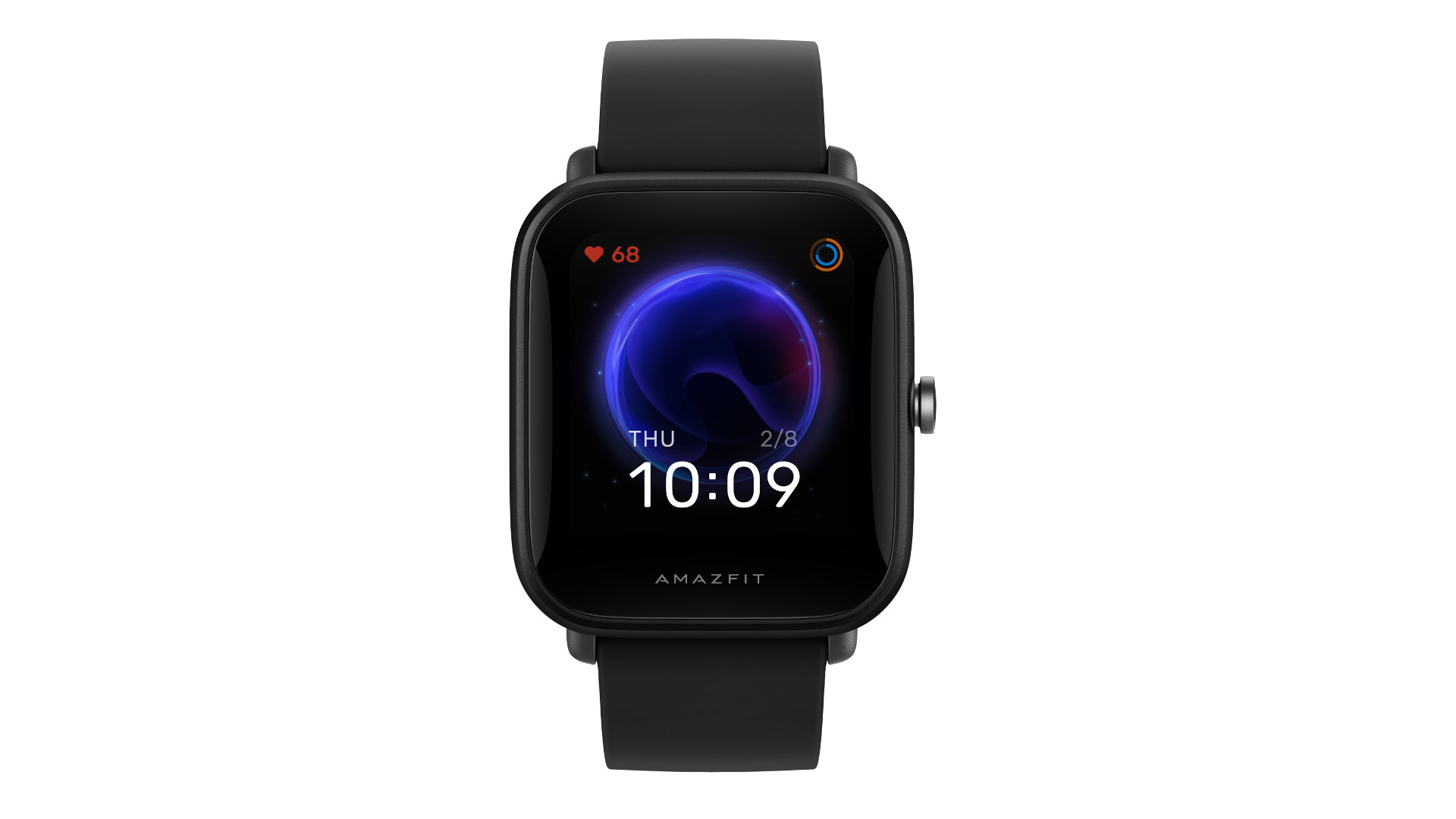
What is the Amazfit Bip U, and what’s new since the Bip S?
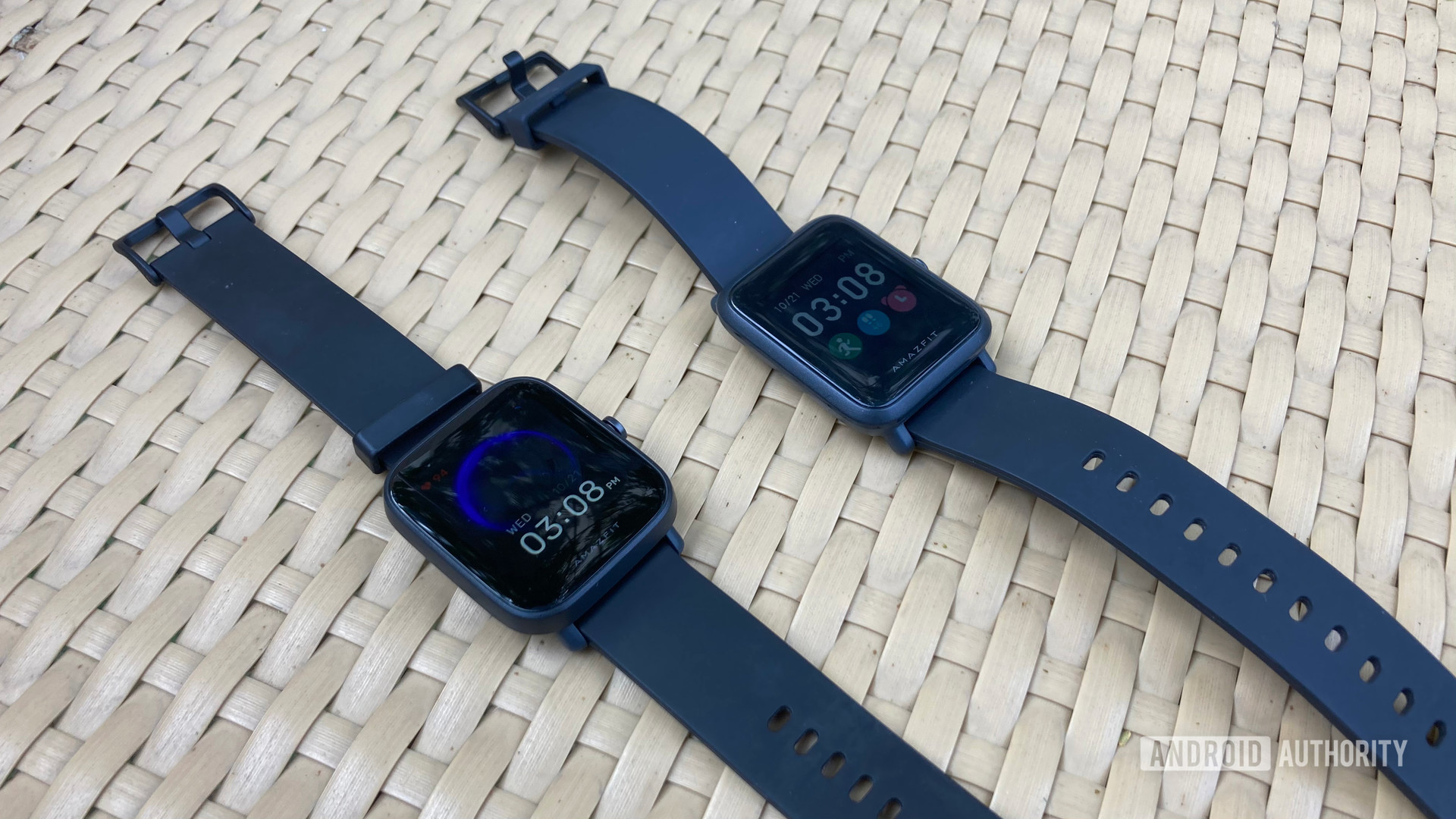
A fitness watch through and through, think of the Amazfit Bip U as the Mi Band 5 or Mi Band 6 with a square display. However, unlike the previous iteration of the Mi Band, the Bip U features a SpO2 sensor (aka blood oxygen tracking) — a feature that Xiaomi has now packed in the Mi Band 6.
You get a 1.43-inch TFT LCD screen on the Amazfit Bip U covered in 2.5D Corning Gorilla Glass 3. You can set the display to remain on all day or light up when you raise your wrist. It’s fitted inside a plastic chassis, while the straps of the watch are made of silicone. The Bip U is available in green, pink, and black color options.
Also read: The best smartwatches you can buy right now
I got the black model of the watch, and at first glance, it looks identical to the Amazfit Bip S. You will notice the subtle differences if you look closely. The display on the Amazfit Bip S looks larger, but the Bip U gives you more screen real estate in a similarly sized housing. However, design and make aside, the two Bip watches have quite a few differences.
I really like the colorful display of the Amazfit Bip S, but the Bip U makes it even more vibrant. The UI has also improved with newer elements such as the Apple Watch-like activity circles, faster navigation, improved notifications view, and increased responsiveness.
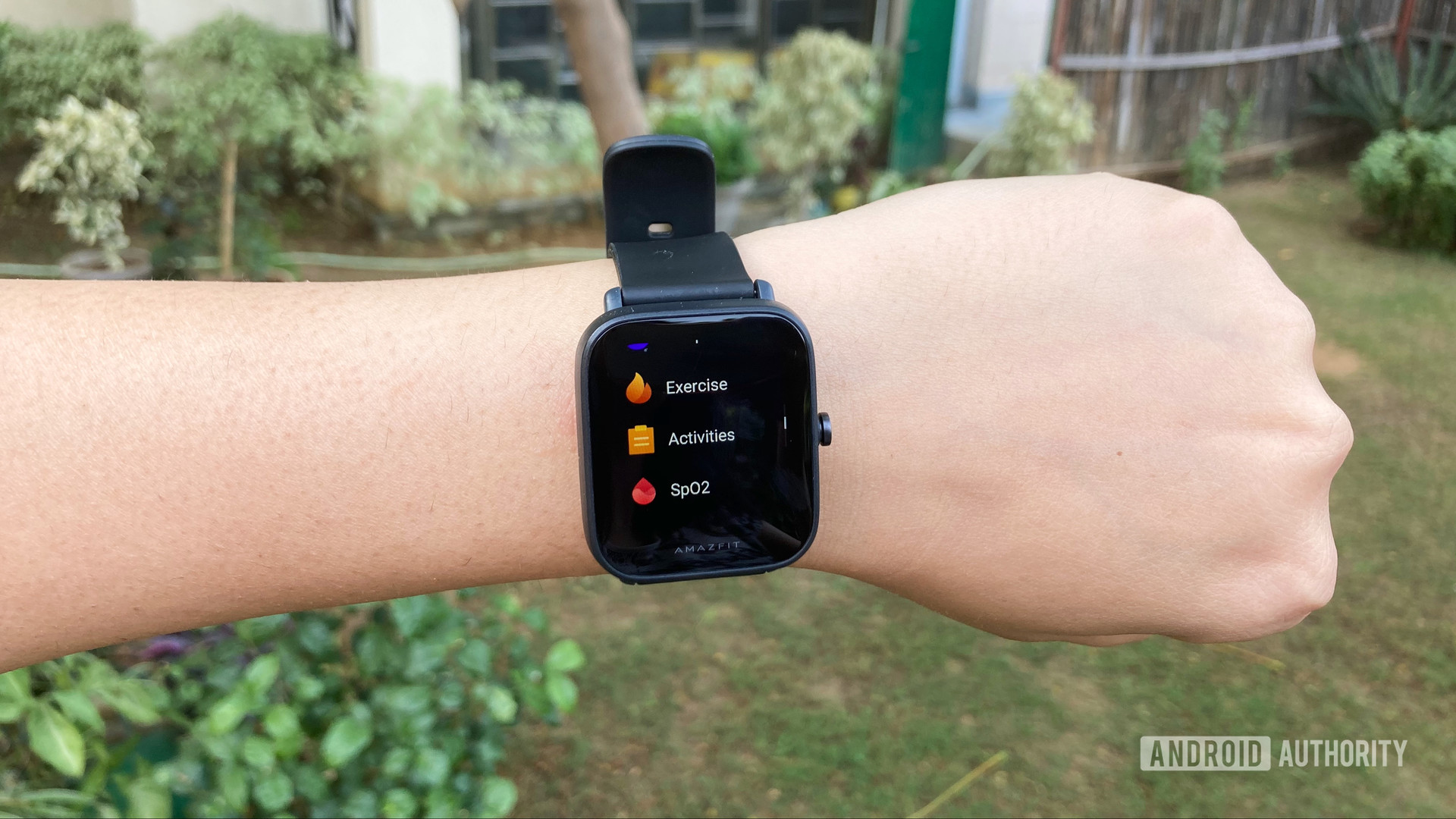
Just like most Amazfit watches, the Bip U is restricted to fitness features. It does not support third-party apps and is incapable of making or receiving phone calls. It also doesn’t have built-in GPS like the Bip S, so it uses your phone’s location services to track walks, runs, cycling routines, and such.
In terms of activity tracking, the Amazfit Bip U features more than 60 sports modes. Those include running, cycling, yoga, dancing, kickboxing, and more. I didn’t have all of them to work with out-of-the-box, but Amazfit added the missing ones through an update that arrived within a few days of the device’s official launch.
The Bip U also adds an improved heart rate sensor, stress tracking, blood oxygen tracking, period tracking, and new watch faces, making it more appealing than its predecessors.
You can see a full list of Amazfit Bip U specs below.
Amazfit Bip U specs
| Huami Amazfit Bip U | |
|---|---|
Display | 1.43-inch color TFT LCD 320 x 302 resolution 2.5D Corning Gorilla Glass 3 |
Sensors | BioTracker 2 PPG biological optical sensor Accelerometer Gyroscope Pulse oximeter |
Battery | 230mAh |
Connectivity | Bluetooth 5.0 BLE |
Tracking and other features | Steps Calories Running Cycling Yoga Swimming Dancing Skating Kickboxing Active hours Treadmill Free Exercise Continuous heart rate monitoring Stress monitoring Sleep tracking Period tracking Music control App and call notifications 5ATM water resistance |
Charging method | Clip/2-pin POGO pin |
Strap | 20mm silicone |
Supported devices | Android 5.0 or iOS 10.0 and above |
Colors | Green, Pink, Black |
Things I like about the Amazfit Bip U
The Amazfit Bip U does what it’s built to do and does it way better than the $200 Amazfit Stratos 3. Basics like step tracking, heart rate monitoring, and distance tracking worked flawlessly. I pitted the Amazfit Bip U against the Mi Band 5, and the tracking data generated by the two was mostly identical. You can see comparable readings from both wearables after a quick cycling routine in the images provided below.
You might have noticed that there’s not much difference between Amazfit’s Zepp app and the Mi Fit App. If you’ve used a Mi Band before, you should feel right at home with the Bip U’s app settings.
The Amazfit Bip U works seamlessly with the Zepp app.
That said, Amazfit has vastly improved its app experience. Bad app connectivity and poor sync have been long-standing problems with Amazfit wearables. It’s one of the main reasons why I refrained from recommending some of the older Amazfit watches. However, the Bip U works seamlessly with the Zepp app. The syncing of activity data with the app is almost instant. Notification alerts are also timely. I didn’t miss any during the time I reviewed the watch.
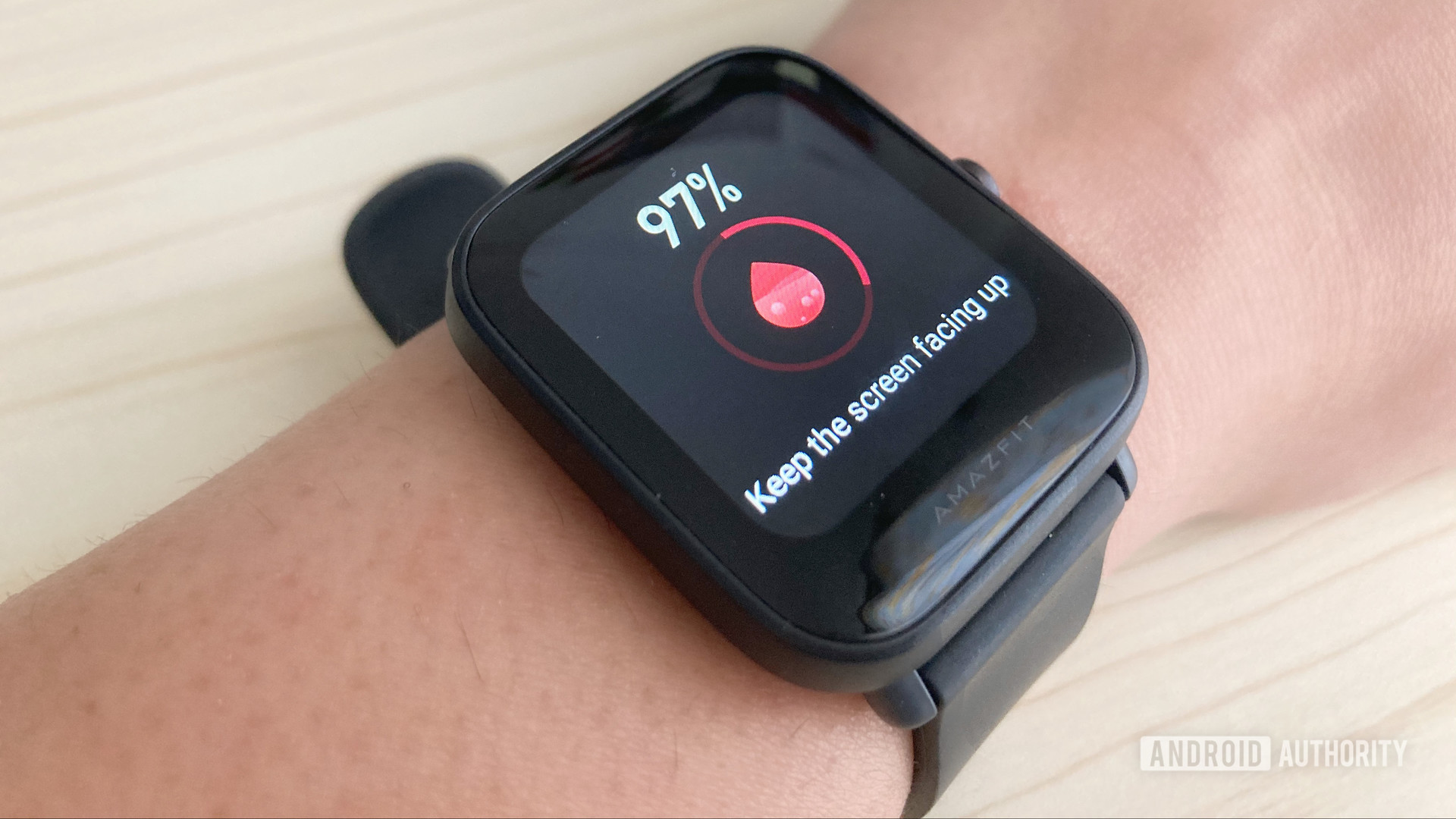
Another impressive feat Amazfit has accomplished is fairly accurate SpO2 or blood oxygen tracking. Its optical SpO2 sensors use red and infrared light to detect your blood oxygen levels, sensing changes in those levels by looking at the color of your blood. The Bip U also features a new OxygenBeats engine that works on Huami’s own biological data model to improve the accuracy of blood oxygen tracking.
The result is a spot percentage reading of your blood oxygen levels. The Zepp app will show you your maximum, minimum, and average SpO2 readings you can track for the day, week, month, or year. A sleep breathing quality feature is also available, but the same is in beta right now. It gives out a score for the quality of your breathing by tracking it while you sleep but isn’t very helpful in terms of deeper analysis.
I compared the Bip U’s SpO2 readings to my fingertip pulse oximeter and got matching results nine out of ten times. The readings were also in line with those from my Apple Watch Series 6. The only caveat is that you need to strap on the watch really tight and not move at all to get a good reading.
Amazfit promises nine days of juice and the Bip U delivers.
When it comes to battery life, Amazfit promises nine days of juice, and the Bip U delivers exactly that. I used the watch for 30 minutes of cycling every day, continuous heart-rate monitoring, and notification alerts with display brightness set at 50%. You won’t feel the need to increase the brightness more than that unless you’re under direct, bright sunlight.
You can charge the Bip U to 100% capacity in two hours. If you run out of battery at the last minute before you have to head out, you can pop the watch on its charger for about 20 minutes to get a 15-20% charge. This should be enough to last you for a couple of workout sessions and then some.
What I don’t like about the Amazfit Bip U
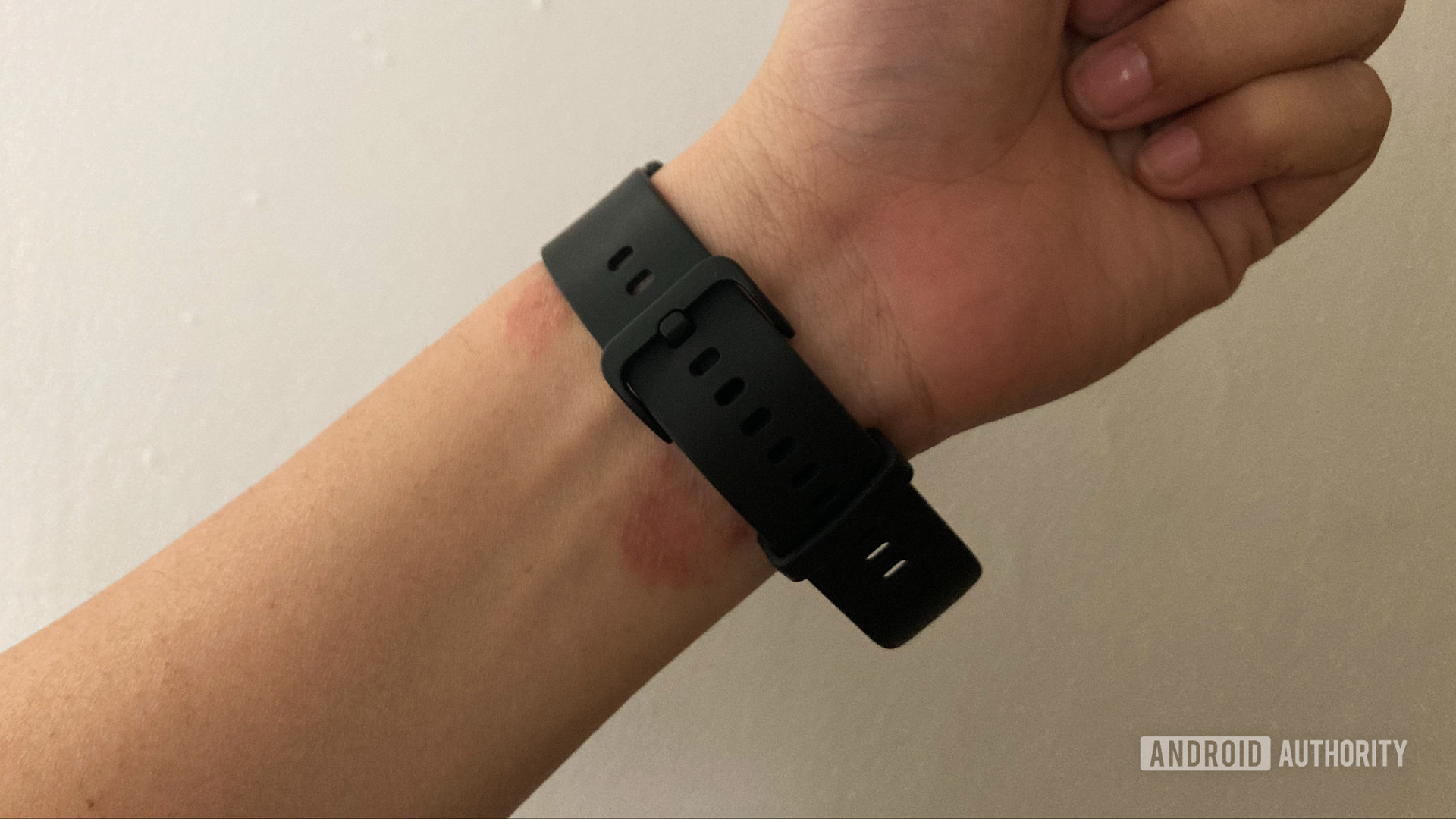
There’s not much I dislike about the Amazfit Bip U. It’s reliable, does activity tracking well, provides notifications on time, helps track sleep with a few pointers on how to improve it, and a lot more. I even like its $57 price. But there is one problematic area that might not sit well with users.
At the end of the first week of using it, I was left with a pretty nasty rash on my wrist.
The plastic materials used on the watch are of extremely poor quality. If you think that the Bip U Pro is any better, you’d be wrong. Both the U series trackers use a cheap silicone wristband that attracts sweat and dust very easily. I inevitably had to take off the watch a couple of times a day because my wrist would get extremely itchy. After a week of using it, I was left with a pretty nasty rash on the inner part of my wrist, where the straps rest.
Your skin might not react to the cheap plastic as mine did, but I should tell you that I did not experience this while using the Mi Band 5 or the Apple Watch 6. A comparison of quality with the latter might not be fair because of the huge price difference, but if the Mi Band can do it right at that price, Amazfit needs to think about the materials it’s using.
Amazfit Bip U review: The verdict
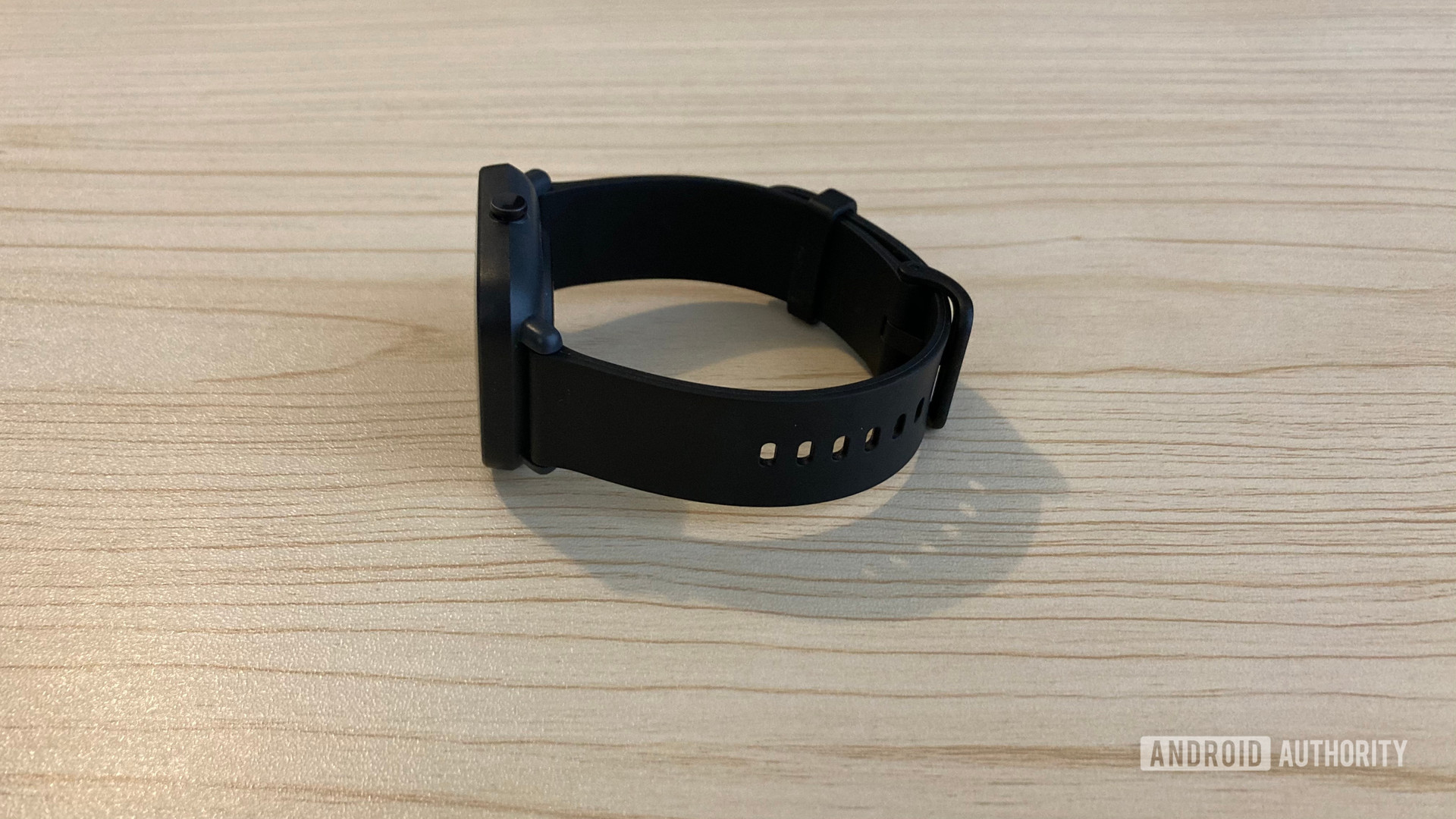
The bottom line is that the Amazfit Bip U is still a pretty impressive fitness watch despite its problematic wrist band. It comes at an equally attractive price and is as good a deal as its successor, the Bip U Pro if you don’t mind connected GPS. That said, its performance and specs still hold up in 2021.
Of course, you can always consider other options. The Mi Band 6, for one, is a close competitor. You could also get the Amazfit Band 5 that has most of the same features as the Bip U. Then there’s also the HUAWEI Band 6 that features an AMOLED display over the Bip U’s LCD screen.
The Samsung Galaxy Fit 2 also comes in around the same price as the Bip U. However, it doesn’t have blood oxygen tracking. Still, if the previous Galaxy Fit is anything to go by, the build quality should be much better than that of the Bip U.
